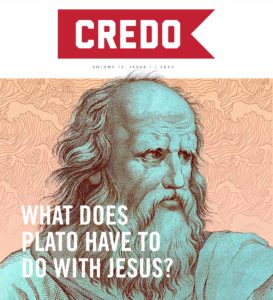
The Platonism of Aristotle and Thomas Aquinas
The latest issue of C redo Magazine focuses on Christian Platonism. The following is one of the issue’s featured articles by Mark K. Spencer. Dr. Spencer is Associate Professor of Philosophy at the University of St. Thomas in Minnesota.
redo Magazine focuses on Christian Platonism. The following is one of the issue’s featured articles by Mark K. Spencer. Dr. Spencer is Associate Professor of Philosophy at the University of St. Thomas in Minnesota.
While our beliefs as Christians are obviously rooted in Scripture and in traditions of practice, doctrine, and theology, our beliefs’ content builds upon ancient Greek thought, especially that of Plato and Aristotle. Those thinkers have provided us with abstract concepts—like nature, cause, and soul—that allow for the precise expression of the truths of the Faith. To really understand what we believe, we must grasp how these historical roots have shaped our faith.
Transcendence and Goodness
Plato argued for the transcendence and goodness of the first cause of all things. Most significantly for Western Christians, this helped the young Augustine move away from Manicheanism (according to which there is a good god and an evil god and matter is evil) toward Christianity, which shares with Platonism the view that all things have their origin in one perfectly good cause. Plato held that what we grasp intellectually are things’ natures—ethical natures like justice itself or mathematical ideas like triangularity in itself. Sense perceivable things share in these natures; for example, some sensory things are just, and some are triangular. But no sensory, material thing has the fullness of a nature: nothing we encounter in the material world is perfectly just or triangular. Plato concluded that what is most real are those natures themselves, which he called “Forms.” On a Christian reworking of this view, some Forms (like mathematical natures) are ideas in God’s mind, while other Forms (like Goodness or Beauty themselves) are identical to God. We are called to allow our minds to be raised to contemplation of and union with those highest Forms, that is, with God.We are called to allow our minds to be raised to contemplation of and union with those highest Forms, that is, with God. Share on X
By contrast, in many texts, Aristotle suggests that what is truly real are not transcendent Forms, but material, sense-perceivable things, which can be understood in themselves. Each material thing contains its own form, whereby it has its nature and is understandable. Furthermore, Plato thought that to know what is good for human beings to do, we must know the Form of Goodness itself (which, on a Christian reading, is God). Aristotle, by contrast, contended that we can figure out what is good for us to do by thinking about the worth of actual concrete goods that we pursue. We need not know the Form of Goodness to know what is ethically good for us to do.
Plato, Aristotle, and Thomas Aquinas
Like Aristotle and against Plato, Thomas Aquinas—one of the first Christian thinkers to draw heavily on Aristotle—thinks that each material thing has its own form. Thomas often uses Plato as a foil for his view of human persons: whereas Plato thinks we are essentially just souls, Thomas argues that we are composites of soul and matter. That is the condition in which we are created; it is a good condition, and it is what the Son of God assumed in the Incarnation. Our perfection, our faith teaches, is not to exist as a disembodied soul, but to live as resurrected bodies. All these Christian views, Thomas thinks, are better explicated with Aristotelian principles, rather than Platonist principles.Aristotle thinks that all things naturally act in such a way that they strive for beauty, that the goal of human life is to become beautiful, and that virtuous action is beautiful action done for the sake of its beauty. Share on X
But despite these oppositions, Plato also had a profound impact on Aristotle and Thomas. For Plato, the highest Form, the source of all that exists, is the Form of Goodness and Beauty. To be good and beautiful is to give of oneself and reveal oneself in such a way that one calls attention to oneself, not narcissistically, but so as to make others self-giving and self-revealing. If absolute Goodness and Beauty are God, the world is a “theophany,” a revelation of God. This view of Plato’s was adopted by early Christian thinkers like Dionysius the Areopagite, on whom Aquinas draws a great deal—but it was also held by Aristotle. While Aristotle does not think we need to know Goodness itself to know what is good to do, he does think that God, the Prime Mover, the perfect being whom all others try to imitate, is perfect Goodness and Beauty. Like his teacher Plato, Aristotle thinks that all things naturally act in such a way that they strive for beauty, that the goal of human life is to become beautiful, and that virtuous action is beautiful action done for the sake of its beauty—that is, done because the action is radiantly, attractively good in itself.

